At one point in the early 1990s, I approached the representative of Argentina in a meeting of the UN sub-commission on human rights. He knew that a local Geneva newspaper had run a small story of impending recognition of gay relationships in his country. That was why I wanted to talk to him, and he knew it. He quickly and accurately denounced the story as pure fiction. He then added: “I am a gay man. My government is opposed to what you are doing.” It was bold of him to offer a bit of solidarity. Yes I was gay. He was too.
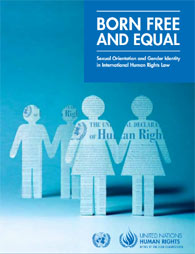
Now, of course, Argentina is the first country in South America with gay marriage, full adoption rights and the most progressive law anywhere on transsexual rights.
Progress at the UN on LGBTI rights was blocked for many years in the political bodies. In recent years, and still, there is an Islamic-Black African bloc that is active against any progress on these issues. Europe, Australia, New Zealand and Canada were supportive, but it was politically dangerous at the UN for any issue to be seen as purely “western.” There was usually no support from Asian governments. Pakistan and Malaysia were active, vocal, and loyal members of the Organization of Islamic Cooperation. They regularly spoke against us. The US was cool under Bush, abstaining rather than voting against us. But the numbers were shifting in our favour.
The first breakthroughs came in the “expert” parts of the UN human rights system. Independent experts were in place to monitor compliance with human rights treaties, or investigate particular pariah countries (Myanmar, North Korea) or consider various issues (such as the right to health, violence against women or extrajudicial and summary executions). The expert reports are sprinkled with references to LGBTI rights. The first time we got a vote in our favour in a UN political body was when opponents tried to discipline an expert for loose sex talk, and were defeated. The next victory in a political body was when an LGBT lobby group was granted “consultative status”, giving rights to attend UN human rights meetings, lobby, and occasionally speak.
Fast forward. In June, 2011, the UN Human Rights Council, a political body where representatives follow government orders, narrowly passed a resolution expressing “grave concern” with human rights abuses against LGBT individuals.
For political reasons, it was good that there was support for the resolution from each of the five official UN ‘regions’ (though, in truth, the initiative was driven by a new Western-Latin American alliance, with Brazil and Argentina playing lead roles).
The 2011 resolution authorised the Office of the UN High Commissioner for Human Rights to prepare a report on the issues involved. The High Commissioner, Navi Pillay, a judge from South Africa, was already on side. We knew that the report would be good. To the surprise of some of us, the UN Secretary General, Ban Ki moon, from South Korea, began making statements supporting our rights. The UN executive (the ‘secretariat’) had joined the UN experts in publicly supporting us.
Our opponents at the UN keep talking against “new rights” that, they said, had not been approved in any UN human rights decision. The new report begins with the assertion that no “new rights” are involved:
The case for extending the same rights to lesbian, gay, bisexual and transgender (LGBT) persons as those enjoyed by everyone else is neither radical nor complicated. It rests on two fundamental principles that underpin international human rights law: equality and non-discrimination. The opening words of the Universal Declaration of Human Rights are unequivocal: “All human beings are born free and equal in dignity and rights.”
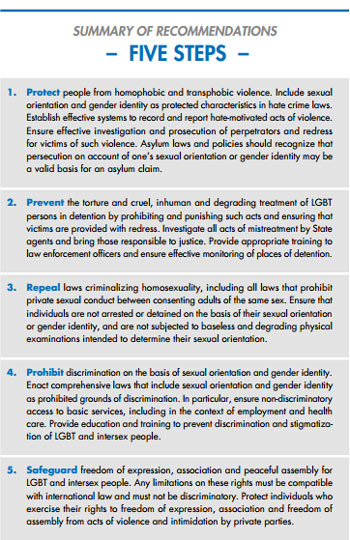
And there we find the reports name – “Born Free and Equal.” The quotation is from the Universal Declaration, not from Lady Gaga.
What I like most are the pictures.
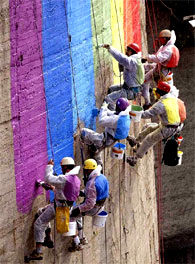
12 – six workmen cabling down some giant concrete silo, painting an enormous vertical rainbow flag.
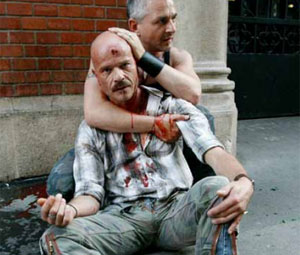
19 – the victim of a homophobic beating.
25 – a Treatment Action Campaign demonstration in South Africa.
28 – a black man in jail.
33 – a candlelight ritual.
37 – a young man, in winter woolies, holding up a sign “Love is a basic human right.’
38 – joyous Filipino activists, flaunting posters.
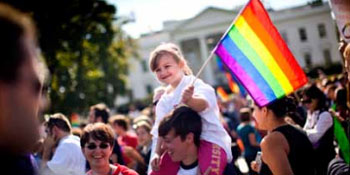
43 – a gay pride demo with a young daughter holding the rainbow flag.
45 – a smiling Indian matron, with the flag.
49 – a cheering gathering (probably of transgender Hijra).
54 – police protecting a pride parade somewhere in eastern Europe.
56 – another big rainbow banner.
59 – another pride parade, more flags.
We really look human in these pictures, and it is clear that we bring a lot of joy to our activism. The report could have been grim and dry. It is saved, to a large extent, by the photographs which inject sunshine into the narrative.
For many years the best booklet, with pictures, was one published by Amnesty International. Now with “Born Free and Equal” we have something more authoritative, with a very serious and current analysis of issues, but also with a celebration of our lives. This is a report that marks a great victory for a few generations of activists and publicists who have worked at the level of the European Community, the Organization of American States and the United Nations.
For lobbying here in ASEAN, we now have both this report and last years report from the Asia Pacific Forum of National Institutions for the Promotion and Protection of Human Rights (www. asiapacificforum.net). Maybe APF can reissue their report with pictures. We should ask for that.
Doug Sanders is a retired Canadian law professor, living in Bangkok. He can be contacted at sanders_gwb@yahoo.ca.











 打印版本
打印版本



















读者回应
Can we contribute something?
It will take centuries to change attitudes on specific items - a general statement like this is much easier to get adopted - or am I being naive?
请先登入再使用此功能。